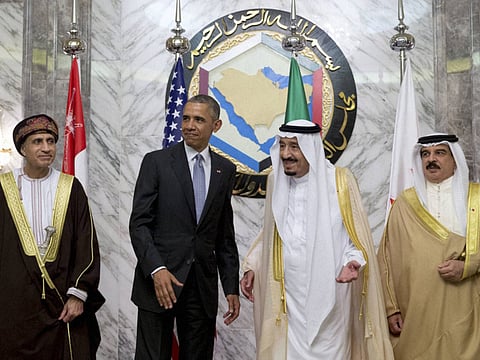‘Air of optimism over Kuwait talks’
The Yemen peace talks in Kuwait and United States President Barack Obama’s visit to Saudi Arabia last week were the topics that made the headlines in the region

The Yemen peace talks held in Kuwait and US President Barack Obama’s visit to Saudi Arabia were the topics that captured headlines in the region this week.
The Yemeni talks in Kuwait open a window of hope for reaching an agreement that puts a stop to the bloodshed and destruction, said UAE’s Al Khaleej.
“Hopes are pinned on the fact that the Yemeni parties would be sensible and reach an agreement that will put Yemen on a roadmap for salvation. A goal that is equally important during the next phase for Yemenis and the Arab coalition forces is combating Daesh [the self-proclaimed Islamic State of Iraq and the Levant] and Al Qaida in order to complete the liberation process. If this mission is accomplished, then the Gulf countries can be at ease and will be rid of a threat that has caused them distress. Yemen is currently undergoing a battle on more than one front: A battle for negotiations that can achieve civil peace, rebuild the country, restore legitimacy and freedom, and a battle against terrorist organisations.”
The Gulf Cooperation Council (GCC) initiative laid the foundations for a solution in Yemen that requires an end to the Al Houthi coup and restoring the legitimate government represented by Yemeni President Abd Rabbo Mansour Hadi, said Qatar’s Al Sharq.
“Negotiating parties in Kuwait can build on this initiative and the outcomes of the Yemeni national dialogue. The parties can commit to peace talks, renounce violence, respect the legitimacy and retreat from the Yemeni capital and main cities. This will strengthen the ceasefire, protect civilians and allow the delivery of humanitarian aid. There is an air of optimism regarding the progress of talks in Kuwait as disputing parties are rising up to the expected level of responsibility and national will power. It is an indication that a solution is possible, regardless of the level of disagreement or divergence of views regarding items on the talks’ agenda.”
If Obama thought that his trip to Saudi Arabia would ease much of the tension his administration has stirred up with countries in the region, he was very much mistaken, said Lebanon’s Daily Star. “His pronouncements on Thursday on the need for communication and consistency were not only wide of the mark, but laced with hypocrisy. He has been calling for Saudi Arabia and its Gulf allies to pour more money and resources into stabilising the spiralling situation in Iraq. But it will not have escaped the memories of those that he addressed that it was his acquiescence to Iran and its puppet former Iraqi Prime Minister Nouri Al Maliki that helped the country get into this vicious, sectarian mess. Obama calls for consistency in dialogue. Yet who will take this lesson from a man whose administration has constantly said one thing about policy in the region, only to do the exact opposite?”
The good news in the heated controversy engulfing the US-Gulf affairs is that Gulf countries have taken a step away from the frame and no longer fully depend on Washington, said the London-based Pan-Arab paper Asharq Al Awsat.
“Obama’s administration mistakenly and insistently believes that any concern or warning raised by Gulf countries against Iranian regional behaviour, directly translates into a cry for help to stand up against Tehran. However, what Gulf countries seek is for Iran not to be rewarded for the terrorism which the US itself acknowledges. What enrages Gulf countries is that the US administration neglects that Iran directly inhibits the best interests of the US and their allies found in the Middle East. We cannot anticipate a prospect on regional stability; so long the network of Iranian militias is not adequately dealt with in a counterterrorism approach.”


